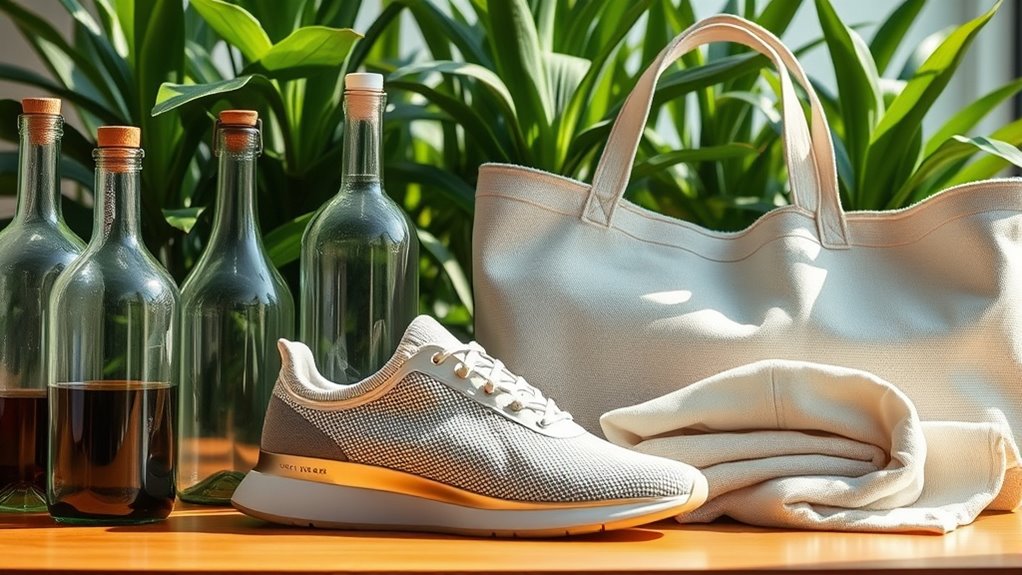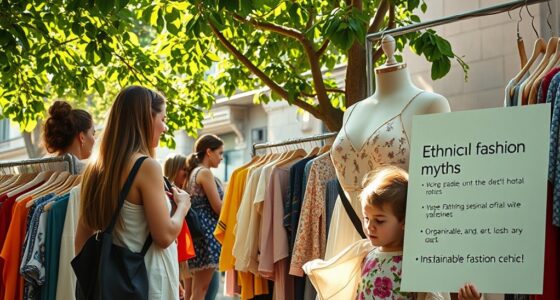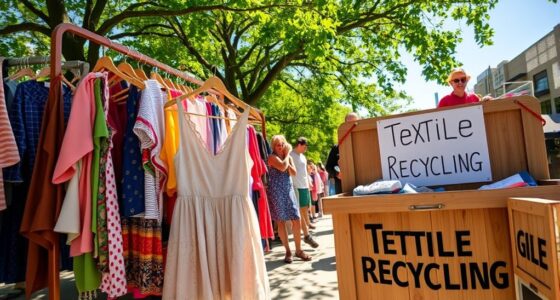If you're looking for brands using recycled materials, you're in luck! Fashion brands like Ecoalf, Girlfriend Collective, and Patagonia lead the way. In cosmetics, Elate Cosmetics and Kiehl's incorporate recyclable packaging. Footwear brands like Rothy's and Veja craft stylish shoes from recycled bottles. Even children's toys from Green Toys use 100% recycled plastic. From home goods to innovative partnerships, tons of brands prioritize sustainability. Discover more about these inspiring companies and their eco-friendly practices!
Key Takeaways
- Ecoalf creates clothing from fishing nets and plastic bottles, promoting sustainable fashion.
- Girlfriend Collective incorporates recycled plastic into activewear and offers a buyback program.
- Patagonia utilizes recycled materials in clothing and packaging to minimize environmental impact.
- Rothy's transforms plastic bottles into stylish shoes, contributing to waste reduction.
- Veja uses B-mesh made from recycled bottles and organic cotton for eco-friendly footwear.
Fashion Brands
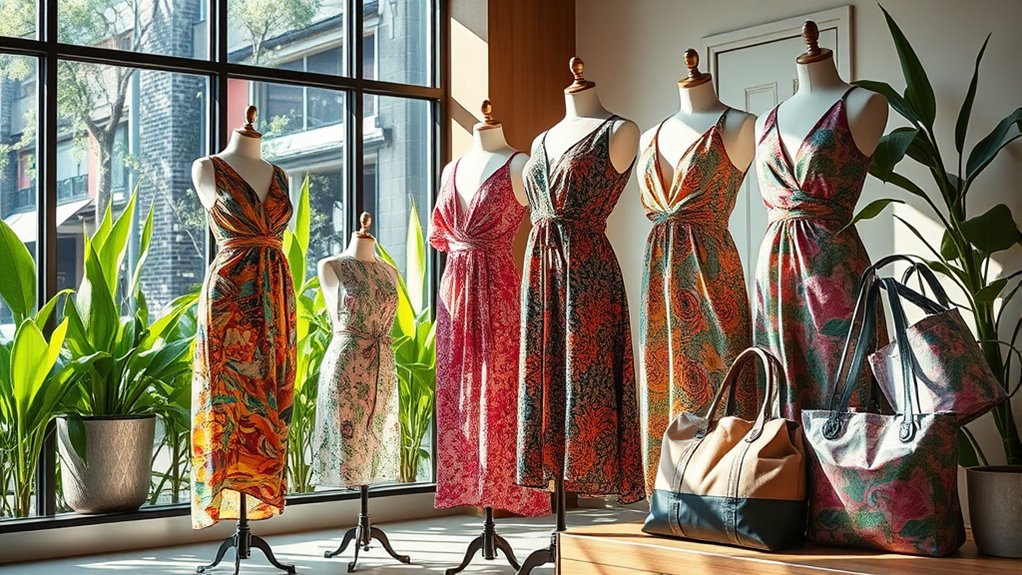
As you explore the fashion industry, you'll discover that many brands are embracing sustainability by using recycled materials in their collections.
For example, Ecoalf creates clothing from fishing nets and plastic bottles, while Girlfriend Collective incorporates recycled plastic into activewear and offers a buyback program.
Patagonia is well-known for its eco-friendly clothing made from recycled materials, and Reformation promotes sustainability through deadstock and upcycled fabrics.
Patagonia champions eco-friendly fashion with recycled materials, while Reformation leads the way in sustainable deadstock and upcycled fabrics.
Luxury brand Stella McCartney utilizes recycled nylon and polyester, showcasing that high fashion can also be eco-conscious.
Additionally, brands like H&M and Everlane are contributing by using recycled polyester in their collections.
Cosmetics and Packaging
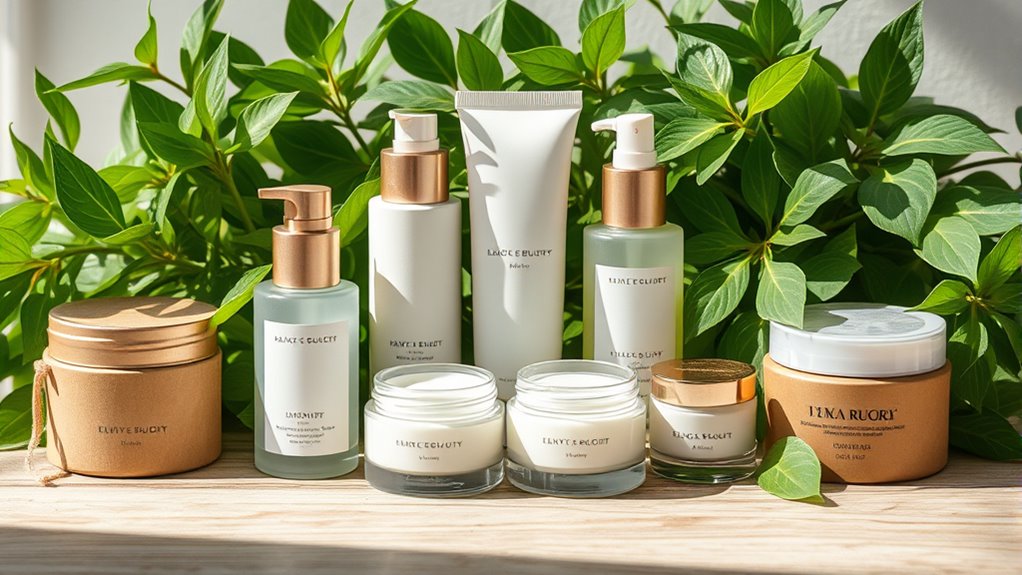
Sustainability is making waves in the cosmetics industry, especially when it comes to packaging.
You'll find brands like Elate Cosmetics offering recyclable tin containers and sustainable bamboo palettes, while River Organics opts for plastic-free paper tubes.
Many companies are focusing on using recycled materials, like Kiehl's, which boasts packaging made from at least 80% recycled content. The use of recycled materials not only reduces waste but also supports a circular economy. Additionally, the emergence of AI technologies is helping brands optimize their supply chains for more sustainable practices. This shift towards sustainability is further enhanced by user privacy considerations that align with consumer demand for ethical products. Furthermore, brands that incorporate energy-efficient systems into their manufacturing processes can further enhance their sustainability efforts.
Thrive Causemetics reduces packaging weight by 65% with glass and PCR materials.
You'll also see innovations like OWAY's recycled glass bottles and Sunday Riley's eco-friendly materials.
With refillable products from brands like Trestique, you can actively participate in the circular economy. Additionally, the focus on quality and sustainability in product offerings is becoming increasingly important for attracting environmentally conscious consumers.
Footwear and Accessories
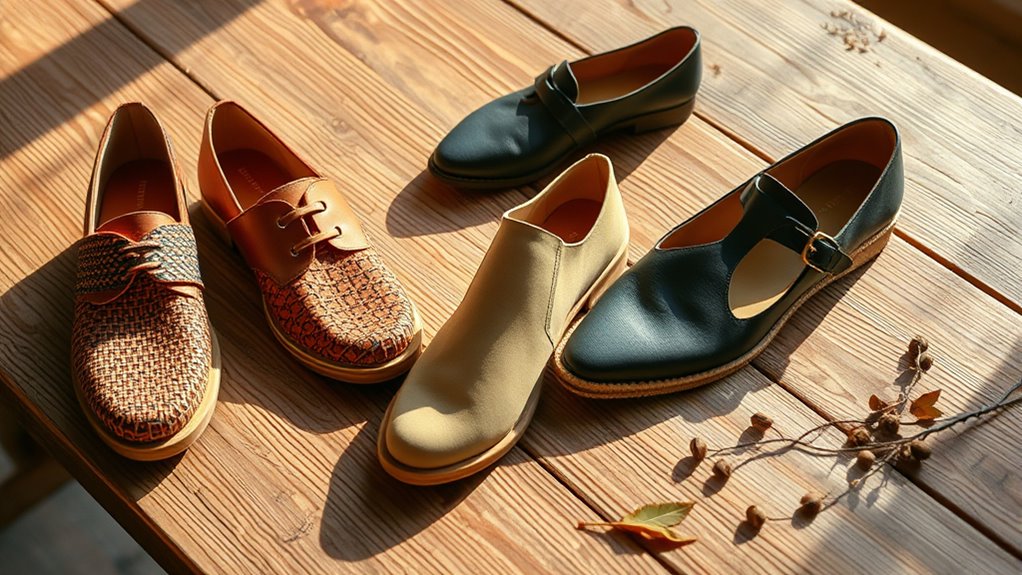
Footwear and accessories are stepping up to the plate in the quest for sustainability, with brands increasingly using recycled materials to create stylish and eco-friendly products. Thousand Fell makes ultra-comfy vegan shoes from post-consumer materials like plastic bottles and yoga mats, while Veja uses B-mesh from recycled bottles and organic cotton. This approach aligns with the growing trend of renewable energy technologies focused on minimizing waste and environmental impact. Additionally, brands are leveraging predictive analytics to anticipate consumer preferences for sustainable products. As more consumers prioritize eco-conscious choices, brands are responding by innovating and expanding their use of recycled materials in their designs.
Rothy's transforms plastic bottles and marine-bound plastic into fashionable shoes, offering a take-back program for old pairs. Thaely innovates with waste plastic bags and rPET, and Cariuma incorporates bamboo and recycled plastics into its sneakers. These brands not only utilize sustainable materials but also commit to ethical production practices, ensuring fair labor and minimizing environmental impact. Investing in Gold IRAs can also support sustainable practices by providing alternative asset options. Furthermore, many of these brands are committed to ethical production practices that prioritize sustainability and fair labor conditions.
You can make a difference by choosing footwear that supports this movement.
Sporting Goods and Activewear
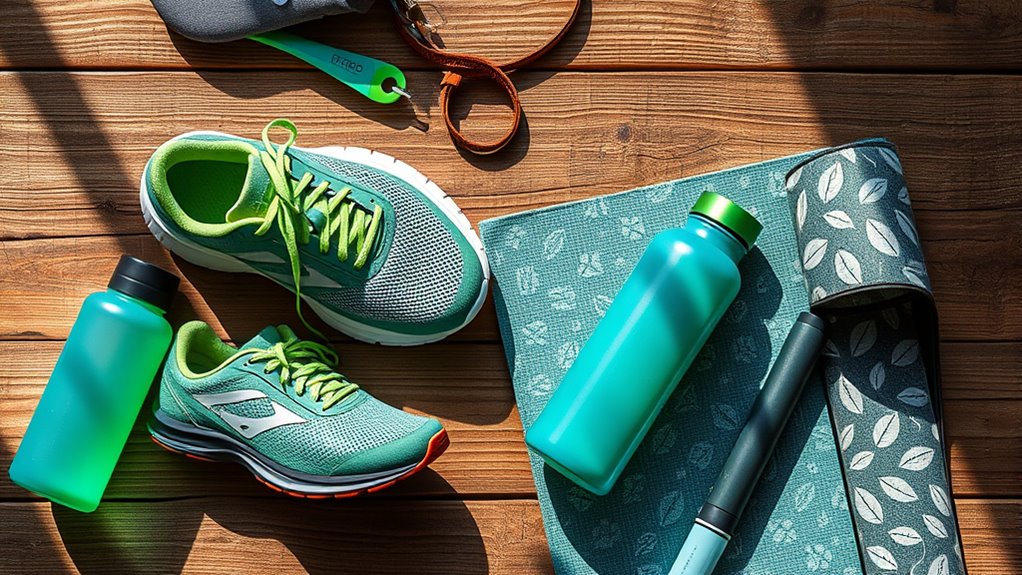
The world of sporting goods and activewear is rapidly evolving, with brands making significant strides in sustainability. You'll find Eco Sports using flax fiber for pickleball paddles and Green Play repurposing rubber for basketballs and footballs. The rising interest in sustainability aligns with the holistic healing benefits of yoga practices, encouraging a healthier lifestyle. Many brands are leveraging data analytics to optimize their supply chains and ensure the efficient use of recycled materials. This approach allows companies to utilize predictive modeling to forecast demand and enhance their sustainability efforts. Additionally, many of these brands are committed to using nutrient-rich ingredients in their products to promote overall health.
Ocean Athletics creates aquatic gear from reclaimed ocean plastics, while CycleEco offers bikes made from recycled metals. In activewear, Nike and Adidas lead the way by incorporating recycled polyester and ocean plastics into their collections. Brands like Girlfriend Collective transform recycled water bottles into stylish activewear, and Reflo uses 100% recycled materials. For golfers, Radmor and Galvin Green focus on sustainable materials like recycled polyester. These innovations prove that you can enjoy an active lifestyle while supporting the planet. Additionally, incorporating sustainable materials into products not only benefits the environment but can also enhance performance and durability.
Children's Products
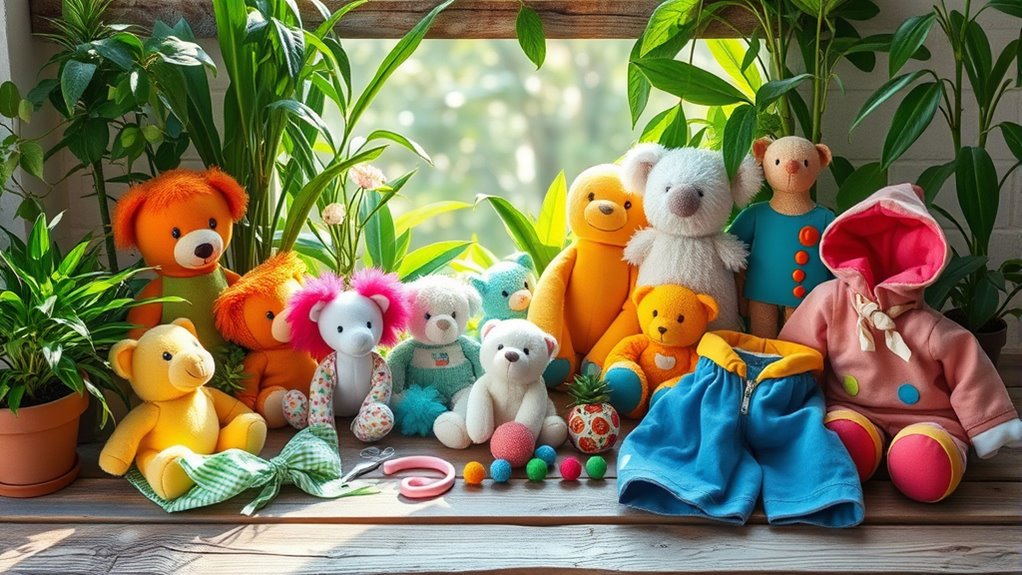
Many brands are stepping up to create children's products that prioritize eco-friendliness and sustainability.
Many brands are committed to producing children's products that emphasize sustainability and eco-friendliness.
For instance, Green Toys makes toys from 100% post-consumer recycled plastic, including milk jugs. Bella Luna Toys focuses on recycled and organic materials, ensuring their packaging is eco-friendly too. The children's market is witnessing a significant shift towards eco-friendly options, with 60% of consumers seeking products that are sustainable. Additionally, many eco-conscious brands are incorporating protein-packed seeds into children's snacks, enhancing their nutritional value. Many of these sustainable toys also promote educational value and development in children, making them a great choice for parents.
Haiti Babi incorporates recycled materials in its onesies and toys, while Jessica Rey utilizes them in kids' swimwear. Brands like Oeuf and Mini Rodini offer GOTS certified organic materials in their apparel.
Additionally, Tender Leaf crafts handmade toys from reclaimed rubberwood. With companies like Nudie Jeans Co promoting recycling programs, you can feel good knowing your purchases support a healthier planet for future generations.
Supporting brands that emphasize eco-friendliness and sustainability can contribute to a more responsible consumer culture for future generations.
Embrace these eco-conscious choices for your little ones!
Home and Electronics

As you explore eco-friendly options for your home, you'll find a growing number of brands committed to using recycled materials in furniture, decor, and electronics.
Herman Miller's Eames Molded Plastic Chair, made from 100% post-industrial recycled plastic, is a standout piece. Sabai incorporates FSC certified wood and upcycled materials, while Etsy offers unique reclaimed furniture that reflects farmhouse design principles. Creating a cohesive design with these materials can enhance the overall atmosphere of your living space. Additionally, incorporating energy monitoring features from smart home devices can further complement your sustainable approach. Air quality can also be improved by utilizing air purifiers made from recycled materials, ensuring a healthier environment.
In decor, The Citizenry provides sustainable rugs from natural materials, and Rejuvenation uses recycled glass in their products.
Although finding electronics made from recycled materials is challenging, many companies participate in e-waste initiatives to manage electronic waste responsibly. Additionally, some brands are focusing on energy efficiency standards to enhance their sustainable offerings.
With brands like these, you can create a stylish, sustainable living space that reflects your commitment to the environment.
Sustainable Innovations
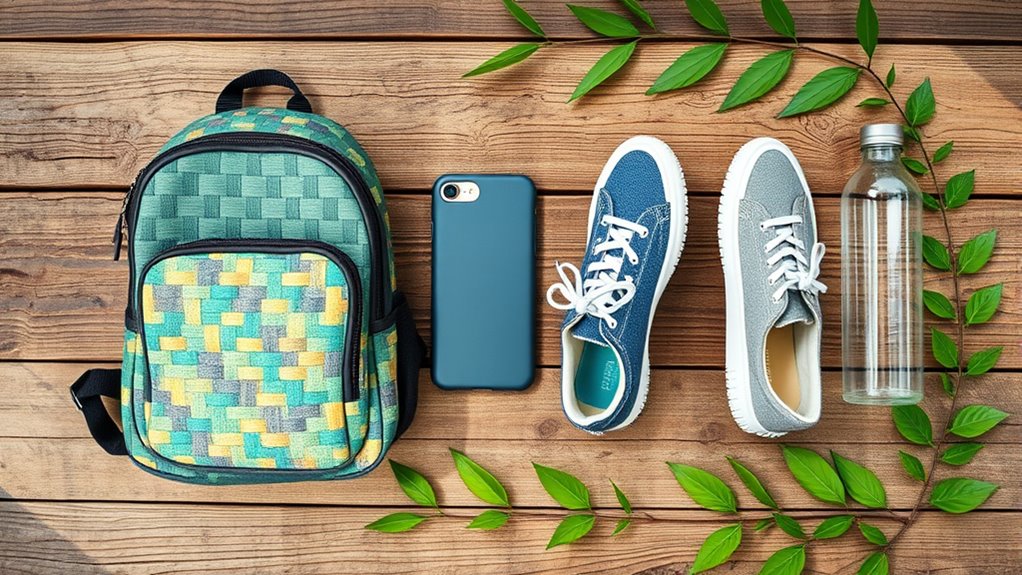
While exploring sustainable innovations, you'll discover a wealth of brands pushing the boundaries of eco-friendly practices.
ECOALF transforms waste like fishing nets and coffee grounds into high-quality clothing, while Gandys International produces stylish apparel from recycled materials, helping orphans worldwide.
ECOALF turns waste into fashion, while Gandys International crafts stylish apparel to support orphans globally.
REPREVE leads the charge with its recycled performance fibers made from plastic bottles, promoting a circular textile economy. Hydrogen, when produced from renewable energy sources, is another sustainable material gaining traction in various industries. Investing in precious metal IRAs is crucial for fostering long-term environmental benefits. Additionally, many brands recognize the importance of optimal conditions for sustainable production methods to enhance their eco-friendly credentials.
Patagonia reduces its environmental footprint by incorporating recycled materials into packaging, and Looptworks upcycles excess materials into quality bags.
In the realm of packaging, Kraft Heinz and Tesco are paving the way with recyclable and reusable solutions. Additionally, brands are increasingly recognizing the importance of building a diverse portfolio to showcase their commitment to sustainability and attract eco-conscious consumers.
Brand Partnerships and Collaborations

Brands are increasingly recognizing the power of collaboration to amplify their sustainability efforts. By partnering with innovative companies, they're creating eco-friendly products that resonate with conscious consumers.
For instance, Zara's collaboration with Circ transforms recycled polycotton blends into new garments, while Stella McCartney teams up with Adidas to incorporate sustainable materials like recycled polyester.
H&M's Conscious Collection showcases their commitment to organic cotton and recycled polyester through strategic partnerships.
The North Face and RÆBURN creatively turn old tents into stylish accessories, while Levi's and Outerknown focus on sustainable denim.
These collaborations not only drive innovation but also raise consumer awareness about sustainability, helping reshape the fashion industry for a greener future. The emphasis on natural materials in these products echoes the broader trend of eco-friendly design found in various industries.
Embrace these partnerships that prioritize both style and environmental responsibility.
Frequently Asked Questions
How Can I Verify a Brand's Sustainability Claims?
To verify a brand's sustainability claims, start by checking their website for sustainability reports and mission statements.
Look for third-party certifications that are recognized and relevant.
Assess their supply chain transparency by seeing if they disclose sourcing information.
You should also read external news articles about their practices.
Finally, use tools like the Good On You app to compare their ratings and gather more insights into their environmental impact.
What Certifications Should I Look for in Sustainable Brands?
Imagine walking through a lush forest, each tree a testament to sustainable practices.
When you're choosing sustainable brands, look for certifications like SCS Recycled Content or Global Recycled Standard. These badges act like a compass, guiding you toward products that prioritize the planet.
Also, consider B Corporation Certification for social responsibility, and Fairtrade for ethical sourcing.
With these certifications, you're not just buying; you're supporting a healthier world.
Are Recycled Materials Less Durable Than New Materials?
Yes, recycled materials can be less durable than new materials.
You might find that they often exhibit reduced chemical and thermal resistance, affecting their overall performance.
Additionally, contamination during recycling processes can lead to quality issues, making them less reliable.
However, strategies like blending with virgin materials or using additives can enhance their durability.
It's essential to consider these factors when choosing between recycled and new materials for your projects.
How Does Recycling Impact the Environment Positively?
Imagine a world where trees whisper their gratitude, oceans sparkle with clarity, and the air feels lighter.
Recycling's like a gentle hand, nurturing the Earth's resources. When you recycle, you're saving precious oil, cutting down emissions, and keeping waste from overwhelming our landfills.
Each bottle, can, or paper you recycle helps reduce pollution and creates jobs, turning your small actions into a powerful wave of positive change for the environment.
Can Recycled Products Be Recycled Again?
Yes, recycled products can often be recycled again, but it depends on the material.
For instance, glass can be recycled indefinitely without losing quality, while plastics may only be recycled a couple of times before they degrade.
When you buy recycled products, you help complete the recycling cycle, encouraging manufacturers to keep using recycled materials.
Conclusion
In a world where everything's disposable, it's downright astonishing to see brands embracing recycled materials like it's the latest fashion trend! You've got luxury fashion houses and innovative tech companies all in on the action, turning trash into treasure. This movement isn't just a passing fad; it's a revolution! So, if you haven't jumped on this eco-friendly bandwagon yet, what are you waiting for? Join the sustainability party—your wardrobe, your conscience, and the planet will thank you!
